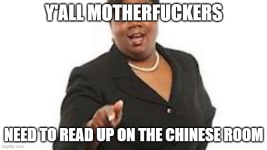Peter_Out
Peu dormi, vidé
- Joined
- Dec 1, 2024
- Posts
- 267
They don't "understand" anything. They're just, as Emily Bender put it, "stochastic parrots", trained on copyrighted works whose creators went unpaid.Well, LLMs can do a lot more than parrot words based on probability. There are "chat" LLMs and "instruct" LLMs that work differently. (DeepSeek is an instruct model). They actually can "understand" context, do semantic analysis and analyze style.
